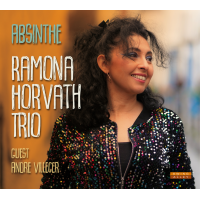Home » Jazz Articles » Roberta Piket
Jazz Articles about Roberta Piket
Roberta Piket: Emanation (Solo: Volume 2)

by Karl Ackermann
The daughter of noted Austrian composer/conductor Fredrick Piket, New York native Roberta Piket took to the piano at an early age, later receiving a degree in jazz piano from New England Conservatory. Piket studied with pianist Richie Beirach, upon returning to New York and receiving an NEA grant. Years later, Beirach has demonstrated his sureness of Piket by serving as production assistant and writing the liner notes for Emanation (Solo: Volume 2). Piket's early jazz influences and an interest in ...
Continue ReadingRoberta Piket: Emanation

by Dan McClenaghan
Pianist Roberta Piket sat down at her instrument alone on Solo (Thirteenth Note Records, 2012). It was her first recording in the format, after and marvelous series of trio and quartet sets. An artist known for her “inside/outside" abilities and a cerebral yet emotive approach to piano, her recording debut as a solo artist was unabashedly beautiful and straight ahead, with much familiar turf: Wayne Shorter's “Nefertiti," saxophonist Sam Rivers' perfect “Beatrice," the American Songbook jewel “I See Your Face ...
Continue ReadingRoberta Piket: Emanation (Solo: Volume 2)

by Dan Bilawsky
In the liner notes for this stimulating album, pianist Richie Beirach, Roberta Piket's friend and once-upon-a-time teacher, refers to the art of solo piano playing as “the Mount Everest of challenges for a jazz pianist." Ain't that the truth. When put in other situations, from episodes in duo discourse to large ensemble endeavors, pianists have the opportunity to play around, with, and off of others. And although it's completely accurate to say that musically communicating in real time with other ...
Continue ReadingRoby Glod, Roberta Piket, Mark Tokar, Klaus Kugel: Op Der Schmelz Live

by Neri Pollastri
Un quartetto internazionale, ripreso dal vivo in un centro culturale lussemburghese, è protagonista di questo ottimo CD sul confine tra il jazz moderno e l'improvvisazione più radicale. Alla guida il francese residente in Lussemburgo Roby Glod, al suo fianco la newyorchese Roberta Piket, l'ucraino Mark Tokar e il tedesco Klaus Kugel, tutti musicisti che hanno lavorato spesso tra loro, maturando una forte intesa, e che--con la sola eccezione di Tokar--sono autori delle composizioni in scaletta. Queste ultime, ...
Continue ReadingRoberta Piket: Solo

by Dan McClenaghan
Listening back on Roberta Piket's discography, with recordings like the trio affair, Love and Beauty (Thirteenth Note Records, 2007) and the ambitious Side, Colors (Thirteenth Note Records, 2013), it's clear that the New York-based pianist has established herself as “an artist deserving wider recognition." With Solo she cements a reputation as a top level jazz artist. Solo features Piket alone with the piano, the most challenging of formats. To say she has risen to the challenge is an ...
Continue ReadingOp Der Schmelz Live

by Dave Wayne
This album is a winner from the git-go. Brooklyn-based pianist Roberta Piket summons the spirits with a gentle, but emotionally direct solo piano rumination. Harmonically rich, with a probing depth that brings Paul Bley and Steve Kuhn to mind, Piket's invocation is just the first in series of golden moments on Op der Schmelz Live. A co-operative quartet comprised of Piket, veteran German drummer Klaus Kugel, the energetic Ukranian bassist Mark Tokar, and the Luxembourg-based French saxophonist Roby Glod, their ...
Continue ReadingRoby Glod / Roberta Piket / Mark Tokar / Klaus Kugel: Op Der Schmelz Live

by Eyal Hareuveni
This pan-European-American collective quartet, named after the Op Der Schmelz venue in Luxemburg (where this album was recorded), focuses in transforming intuitively detailed sonic moments into balanced movements, full of surprises and risk- taking. The quartet is comprised of four experienced improvisers--Luxemburg-based saxophonist Roby Glod, New Yorker pianist Roberta Piket, Ukrainian bassist Mark Tokar and Köln-based drummer Klaus Kugel- -who share emphatic interplay, a discursive approach and natural intimacy. All the pieces begin in a conventional manner ...
Continue Reading



















